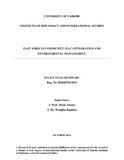| dc.description.abstract | Environmental problems associated with waste and emissions produced from various supply
chain activities have forced organizations, facing competitive, regulatory and community
pressures, to move towards greening their supply chains. A number of challenges frustrate
efforts on environmental management. This research study sought to establish the effects of the
EAC integration on the management of the environment. The study also sought to explore the
environmental challenges facing East African region, to analyze the principles, norms, rules and
decision making procedures within the East African Community that affect Environmental
Management Practices, to evaluate the efficiency and effectiveness of policy measures and how
they affect environmental management within the EAC region and to recommend measures to
improve environmental management practices within the region. The target population of the
study was the environmental organizations and bodies. The design of this research was a
descriptive survey. The questionnaire comprised of both closed-ended and open ended questions.
The data was then coded and keyed into the Statistical Package for Social Sciences (SPSS) for
analysis. This is a computer aided tool for the analysis that help to generate descriptive statistics
such as means, standard deviations and frequency distribution generated the data. Data
presentation was done by the use of pie charts, bar charts and graphs, percentages and frequency
tables. This study established that declining water quality was the most severe challenge/threat
followed by loss of bio-diversity, drought, declining water quantity, waste management, climate
change, food insecurity and floods. The study also found that there were weaknesses in the
implementation of policies that affect environmental management practices. The main cause of
weaknesses in making these policies effective was related to implementation followed by
policies. EAC Secretariat was moderately effective in the implementation of policies. The
biggest challenge in implementing policies is on funding to facilitate the process. To improve the
environmental management practices in the basin, bilateral cooperative frameworks should be
established through MoUs, and let there be a desk officer for these sub basins of the Lake
Victoria Basin. EAC and LVBC Secretariats should be accountable to all decisions made by
Council of Ministers and Summit; and produce results, outcome and impacts that can be
measured and monitored and reported to all EAC people. | en_US |

